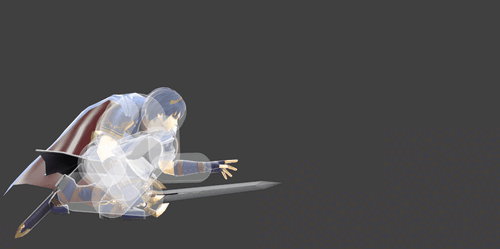Marth (SSBU)/Down tilt: Difference between revisions
No edit summary |
JUSTplayIN (talk | contribs) m (→Overview: removed redundant word) Tag: Mobile edit |
||
| Line 10: | Line 10: | ||
At mid to higher percents, depending on the opponent's [[directional influence]], Marth may instead attempt to follow up with a dash into [[../Neutral aerial|neutral air]] or forward air. Sometimes this does not combo, in which case overshooting or feigning the approach should be anticipated to avoid being [[shield grab]]bed. | At mid to higher percents, depending on the opponent's [[directional influence]], Marth may instead attempt to follow up with a dash into [[../Neutral aerial|neutral air]] or forward air. Sometimes this does not combo, in which case overshooting or feigning the approach should be anticipated to avoid being [[shield grab]]bed. | ||
Down tilt is a deceptively underwhelming tool for [[edgeguarding]] low recoveries. The more eminent method of edgeguarding either involves leaving the stage itself to attack directly with an aerial, or using [[ledge trump]] into [[../Back aerial|back air]] for a near-stage edgeguarding option. Regardless, it still has usage as an edgeguarding tool. In particular, there are a great many recoveries that move a character linearly, often towards the ledge, but which do not immediately grab the ledge | Down tilt is a deceptively underwhelming tool for [[edgeguarding]] low recoveries. The more eminent method of edgeguarding either involves leaving the stage itself to attack directly with an aerial, or using [[ledge trump]] into [[../Back aerial|back air]] for a near-stage edgeguarding option. Regardless, it still has usage as an edgeguarding tool. In particular, there are a great many recoveries that move a character linearly, often towards the ledge, but which do not immediately grab the ledge on contact. In this case, down tilt can be used to determine whether this timing is even possible to exploit, however forward smash has a tendency to hit slightly below the ledge, allowing for a strong punish if the opponent's recovery fails to grab the ledge. | ||
==Update History== | ==Update History== | ||
Latest revision as of 12:12, July 20, 2024
Overview[edit]
Marth's down tilt is one of his safest poke tools that also leads to any kind of meaningful reward. If an approach is stuffed, at lower percents this often leads to a tech chase situation if a dash is buffered as soon as possible. This leads to the following follow-ups:
- If no tech or tech in place occurs, an additional down tilt or down smash can be applied to either continue inflicting damage or end a stock.
- If a tech rolls occur, either a forward tilt (more reliable) or forward smash (less reliable) can be used to end a stock.
The latter scenario is potentially hard to execute correctly, relying on a high reaction speed or a hard read. Therefore, one backup strategy is to down tilt again anyway and react thereafter. Sometimes Marth will be able to dash into forward air in the correct direction to stuff mashing or grab to punish habitual shielding.
At mid to higher percents, depending on the opponent's directional influence, Marth may instead attempt to follow up with a dash into neutral air or forward air. Sometimes this does not combo, in which case overshooting or feigning the approach should be anticipated to avoid being shield grabbed.
Down tilt is a deceptively underwhelming tool for edgeguarding low recoveries. The more eminent method of edgeguarding either involves leaving the stage itself to attack directly with an aerial, or using ledge trump into back air for a near-stage edgeguarding option. Regardless, it still has usage as an edgeguarding tool. In particular, there are a great many recoveries that move a character linearly, often towards the ledge, but which do not immediately grab the ledge on contact. In this case, down tilt can be used to determine whether this timing is even possible to exploit, however forward smash has a tendency to hit slightly below the ledge, allowing for a strong punish if the opponent's recovery fails to grab the ledge.
Update History[edit]
 The tipper hitbox of down tilt is larger, and sourspot has been slightly shrunken (16.7u → 15.7u), making it easier to land the sweetspot.
The tipper hitbox of down tilt is larger, and sourspot has been slightly shrunken (16.7u → 15.7u), making it easier to land the sweetspot.
Hitboxes[edit]
Timing[edit]
| Hitboxes | 7-8 |
|---|---|
| Interruptible | 24 |
| Animation length | 49 |
Lag time |
Hitbox |
Interruptible |
Trivia[edit]
- The move has a 35% trip chance that can only happen on slants due to the launch angle.
|

